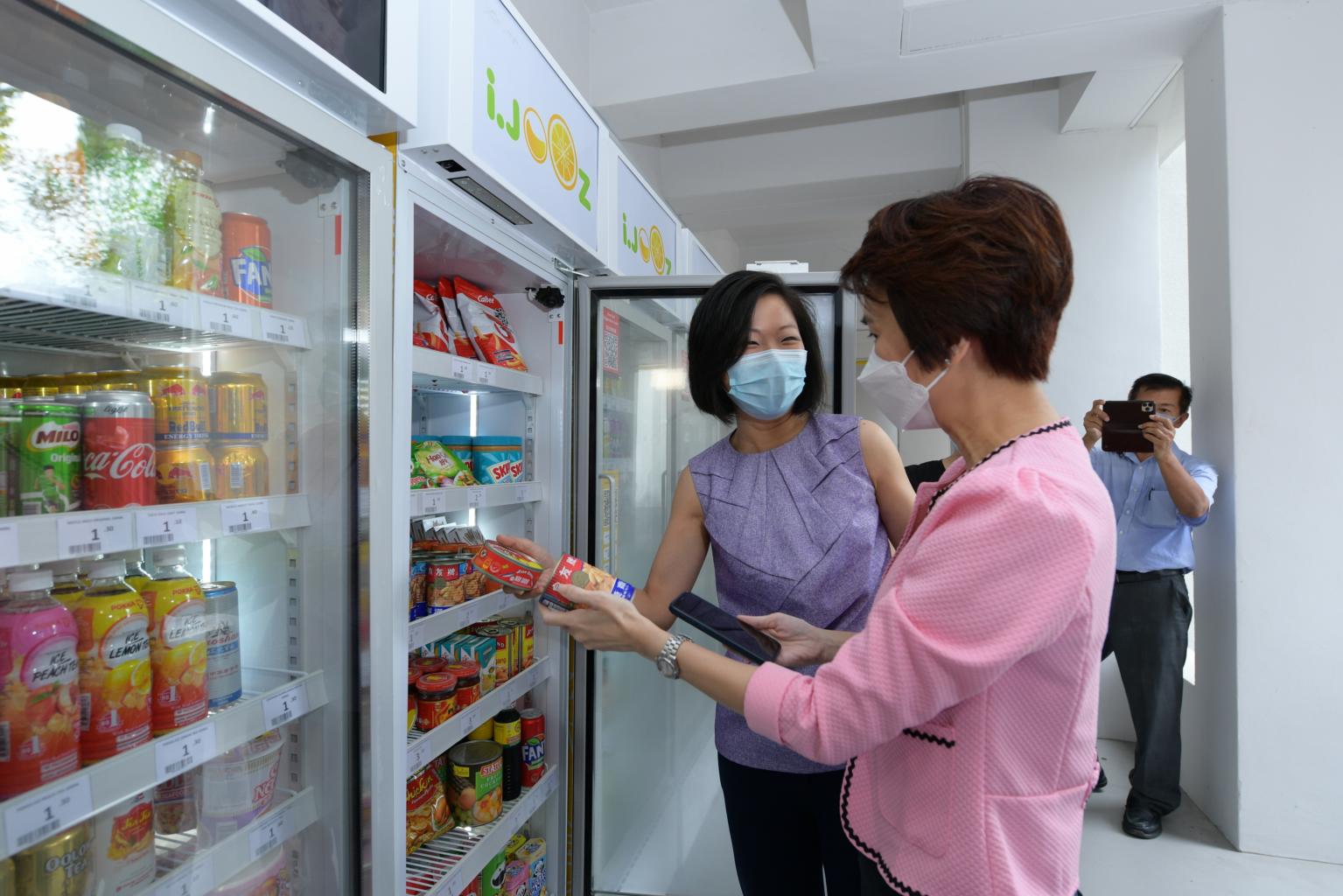Digital kiosks launched in Bukit Gombak, Clementi to help heartland minimarts reach customers 24/7
Sign up now: Get ST's newsletters delivered to your inbox

Senior Minister of State for National Development Sim Ann (left) and Minister of State for Trade and Industry Low Yen Ling at the launch on Thursday.
ST PHOTO: NG SOR LUAN
SINGAPORE - It opened in Bukit Gombak in 2005 selling fresh vegetables, fruits and daily necessities like canned food, drinks and household products to people in the community.
Today, Guan Meat Enterprise minimart has expanded with seven unmanned 24-hour kiosks stocked with similar items located in Bukit Batok.
To make a purchase, users scan a QR code connected to an account they have registered for with their credit card details to unlock the kiosk and claim their items.
Mr Oh Zhen Yu, 21, who helps his mother, Madam Huang Shu Ling, run the business, said on Thursday (Nov 25): "Since we are open only from 5am to 7pm, we are unable to compete with the large supermarkets, but at least (the kiosks) enable us to provide items to customers 24 hours a day, seven days a week."
The year-long pilot programme using unmanned digital kiosks was launched on Thursday by Enterprise Singapore, the Housing Board and the Federation of Merchants' Associations, Singapore, as part of efforts by the Heartland Digitalisation and Revitalisation Committee.
A total of 11 kiosks, stocked by Guan Meat Enterprise and another family-run heartland minimart, Kee Guan Huat Supermarket, have been placed at the void decks of HDB blocks in Bukit Gombak and Clementi.
Guan Meat Enterprise has deployed three kiosks at Block 390 Bukit Batok West Avenue 5, and another four at Block 384 Bukit Batok West Avenue 5.
In Clementi, there are four kiosks at Block 312A Clementi Avenue 4 stocked by Kee Guan Huat Supermarket.
Minister of State for Trade and Industry Low Yen Ling and Senior Minister of State for National Development Sim Ann, who co-chair the Heartland Digitalisation and Revitalisation Committee, attended the launch yesterday.
Ms Low told The Straits Times: "When you talk about digitalisation, a lot of people think it is just e-commerce, but this is another interesting way to go digital and stay relevant with changing consumer demand."
She said the committee had received feedback from merchants that they are getting older and cannot operate for a 12-hour duration any more, and that they were worried they would lose their customers and their takings would be affected.
"(The kiosks) are meant to help our HDB shops extend their reach and increase potential sales, and complement the existing minimart," added Ms Low.
The kiosks come in refrigerated and non-refrigerated versions and feature items ranging from canned and dried food items to daily household necessities such as detergent, and even headphones.
They are equipped with artificial intelligence camera technology that detects movement when items are removed. The user's card will be charged accordingly once the door is locked again.
The kiosks track inventory in real time as they are integrated with a back-end inventory management system that is automatically updated when purchases are made.
Minimart operators can analyse the data to manage inventory based on customer preferences.
"What is more powerful is the data analytics that will allow (merchants) to automatically track and gauge consumer demand and change their daily offerings," said Ms Low.

Customers can sign up for an account through their phones and pick up items by themselves at any time of the day.
ST PHOTO: NG SOR LUAN
Mr Oh, who is waiting to go to university, said: "The goods stocked in our kiosks now are bestsellers, but we will monitor the movement of items and replace slow-moving stocks with fast-moving ones."
Ms Low said her committee and the partners involved will track the response to the pilot.
"(Shopkeepers) see this as a way of opening up more shops without additional manpower costs, so we have a pipeline of strong interest... but we will need to monitor the response and the feedback from the residents and shopkeepers," she said.
"We will scale it accordingly in due course."


